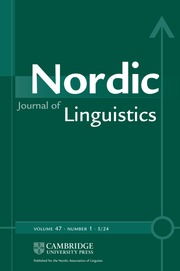Article contents
Deverbal nouns, lexicalization and syntactic change
Published online by Cambridge University Press: 14 May 2007
Abstract
Deverbal nouns are often referred to as hybrids, containing both verbal and nominal features. In many languages deverbal nouns tend to develop into what Vendler (1967) called perfect nouns. Various stages of this development in Norwegian are proposed, drawing on Grammaticalization Theory and Lexicalization Theory. Frequency data are provided from a large newspaper corpus. The deverbal nouns are analyzed as going through a process of lexicalization where reduction in compositionality, reduced token frequency and increased idiosyncrasy are central elements. This process is triggered by relevance to the root, language use, isomorphism and the maximal difference principle. The article shows that Norwegian deverbal nouns are in a state of flux and that even different members of the same morphological type may behave quite differently syntactically and semantically.
- Type
- Research Article
- Information
- Copyright
- © 2007 Cambridge University Press
- 5
- Cited by


